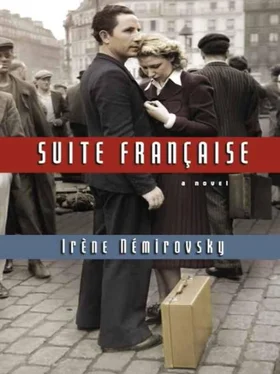Irène Némirovsky - Suite Française
Здесь есть возможность читать онлайн «Irène Némirovsky - Suite Française» весь текст электронной книги совершенно бесплатно (целиком полную версию без сокращений). В некоторых случаях можно слушать аудио, скачать через торрент в формате fb2 и присутствует краткое содержание. Жанр: Историческая проза, на английском языке. Описание произведения, (предисловие) а так же отзывы посетителей доступны на портале библиотеки ЛибКат.
- Название:Suite Française
- Автор:
- Жанр:
- Год:неизвестен
- ISBN:нет данных
- Рейтинг книги:4 / 5. Голосов: 1
-
Избранное:Добавить в избранное
- Отзывы:
-
Ваша оценка:
- 80
- 1
- 2
- 3
- 4
- 5
Suite Française: краткое содержание, описание и аннотация
Предлагаем к чтению аннотацию, описание, краткое содержание или предисловие (зависит от того, что написал сам автор книги «Suite Française»). Если вы не нашли необходимую информацию о книге — напишите в комментариях, мы постараемся отыскать её.
"A book of exceptional literary quality… it has the kind of intimacy found in the diary of Anne Frank."-The Times Literary Supplement
"Heroic… a novel about a nightmare in which the author is entirely embedded."-ANITA BROOKNER, The Spectator
"An exceptionally forceful and frank testimony… a real find. A masterpiece."-L'Express
"Remarkable as the story of the publication of Suite Française is, it will finally be of anecdotal interest compared with the importance of the book. Here is the work of a fine novelist at the top of her form, writing about the fate of her adopted country with a pitiless clarity."-Evening Standard
Suite Française — читать онлайн бесплатно полную книгу (весь текст) целиком
Ниже представлен текст книги, разбитый по страницам. Система сохранения места последней прочитанной страницы, позволяет с удобством читать онлайн бесплатно книгу «Suite Française», без необходимости каждый раз заново искать на чём Вы остановились. Поставьте закладку, и сможете в любой момент перейти на страницу, на которой закончили чтение.
Интервал:
Закладка:
Please find enclosed a letter which I insist be sent to the German ambassador as a matter of URGENCY. If you could find anyone who could approach him personally and give it to him (Count de Chambrun perhaps, who, I believe, is prepared to take an interest in my wife), that would be perfect. But if you cannot find anyone able to do it QUICKLY, would you be so kind as to take it to the embassy or just post it. Thank you in advance. Of course, if this letter will upset the steps already taken, then tear it up, otherwise, I really wish it to be sent.
I fear the same thing might happen to me. In order to avoid material concerns, could you send Mlle Dumot an advance on her monthly payments for '43? I am afraid for the children.
27 July 1942
Michel Epstein to the German ambassador, Otto Abetz
I know that I am taking a great liberty in writing to you personally.
Nevertheless, I am taking this step because I believe that you alone can save my wife, my only hope lies with you.
Allow me therefore to explain to you the following: before leaving Issy, the German soldiers who were occupying the village gave me, in gratitude for the way we treated them, a letter which reads:
O.U. den I, VII, 41
Kameraden. Wir haben längere Zeit mit der Familie Epstein zusam-mengelebt und diese sehr anständige und zuvorkommende Familie kennen-gelernt. Wir bitten Euch daher, sie damitsprechend zu behandeln. Heil Hitler!
Hammberger, Feldw. 23599 A. [20]
[20] For translation, see note 18 on p. 369.
And yet, on the 13 July my wife was arrested. She was taken to the concentration camp at Pithiviers (Loiret) and, from there, sent somewhere else, but I do not know where. This arrest, I was told, was a result of general instructions given by the occupying authorities regarding the Jews.
My wife, Madame M. Epstein, is a very famous novelist, I. Némirovsky. Her books have been translated in a great many countries and two of them at least- David Golder and Le Bal -in Germany. My wife was born in Kiev (Russia) on 11 February 1903. Her father was an important banker. My father was President of the Syndicat des Banques Russes (Union of Russian Banks) and Executive Director of the Bank of Commerce of Azov-Don. Both our families lost considerable fortunes in Russia; my own father was arrested by the Bolsheviks and imprisoned in the Saint-Peter and Paul Fortress in St. Petersburg. We had the greatest of difficulty in finally managing to flee Russia in 1919 and we then took refuge in France, where we have lived ever since. All this must satisfy you that we feel nothing but hatred for the Bolshevik regime.
In France, not a single member of our family has ever been involved in politics. I was a bank manager and as for my wife, she became a highly esteemed novelist. In none of her books (which moreover have not been banned by the occupying authorities) will you find a single word against Germany and, even though my wife is of Jewish descent, she does not speak of the Jews with any affection whatsover in her works. My wife's grandparents, as well as my own, were Jewish; our parents practised no religion; as for us, we are Catholic and so are our children who were born in Paris and are French.
If I may also take the liberty of pointing out to you that my wife has always avoided belonging to any political party, that she has never received special treatment from any government either left-wing or right-wing, and that the newspaper she contributed to as a novelist, Gringoire, whose director is H. de Carbuccia, has certainly never been well-disposed towards either the Jews or the Communists.
Finally, for many years my wife has been suffering from chronic asthma (her doctor, Professor Vallery-Radot, can attest to this) and internment in a concentration camp would be fatal for her.
I know, Ambassador, that you are one of the most eminent men in your country's government. I am convinced you are also a just man. And it seems to me both unjust and illogical that the Germans should imprison a woman who, despite being of Jewish descent, has no sympathy whatsoever-all her books prove this-either for Judaism or the Bolshevik regime.
28 July 1942
André Sabatier to Count de Chambrun
I have received this very moment a letter from the husband of the author of David Golder, a copy of which I have taken the liberty of enclosing for you. This letter contains details which might prove useful. Let us hope that they will allow you to bring this matter to a positive conclusion. I thank you in advance for everything you are trying to do for our friend.
28 July 1942
André Sabatier to Mme Paul Morand [21]
I wrote to Monsieur Epstein yesterday saying what we had agreed, thinking it would be better to write than to send a telegram. This morning I received his letter in the post. It clearly contains some interesting details.
[21] Paul Morand was a French writer and diplomat who retained his post under the Vichy government. In 1958 he was refused entry into the Académie Française but was eventually admitted in 1968.
28 July 1942
Michel Epstein to André Sabatier
I hope you received the letter I wrote yesterday and that the one intended for the ambassador has been given to him, either by Chambrun or by someone else, or directly by you. Thank you in advance.
In reply to your note of yesterday: I think that in David Golder, the chapter where David does a deal with the Bolsheviks to buy oil rights cannot be seen as very kindly towards them, but I don't have a copy of D. Golder here, could you check? You have a copy of the manuscript of Les Echelles du Levant, [22] which appeared in Gringoire, and which is more savage towards the hero, a charlatan doctor who comes from the Levantine, but I can't remember whether my wife specifically made him Jewish. I think so.
[22] This novel appeared in instalments in Gringoire beginning in May 1939. It was published in 2005 by Editions Denoël under the title Le Maître des Ames.
I see in chapter XXV of her biography of Chekhov, the following sentence: "The short story 'Ward 6' contributed greatly to Chekhov's fame in Russia; because of it, the USSR claimed him as their own and stated that, had he lived, he would have joined the Marxists. The posthumous fame of a writer is filled with such surprises…" Unfortunately, I can't find anything else and this is very little.
Is there really no way at all to find out from the French authorities whether or not my wife is still in the camp at Pithiviers? Ten days ago, I sent a telegram, with a prepaid reply, to the commandant of the camp and have had no reply. Is it possible that just knowing where she is would be forbidden?
I was told that my brother Paul is in Drancy,[23] why am I not allowed to know where my wife is? Alas…
Goodbye, dear friend. I don't know why I have faith in my letter to the ambassador. Michel.
[23] Concentration camp to the north-east of Paris.
29 July 1942
André Sabatier to Mme Paul Morand
Here is the letter I told you about on the telephone. I think you are better placed than anyone to decide if it is best to send this letter to the person its author wants to have it. On the content, I can hardly comment, as for the details, it seems to me there are certain sentences which are rather unfortunate.
29 July 1942
Mavlik[24] to Michel Epstein
My dearest. I hope you have received my letters but I fear they may have been lost for I wrote to Julie and our aunt misunderstood her name on the telephone. My dearest, once again I beg you to stay strong for Irène, for the girls, for everyone else. We do not have the right to lose heart since we are believers. I was mad with grief but I am in control again, I spend all day long trying to find out some news and seeing people in the same situation. Germaine[25] got back the day before yesterday, she will be leaving for Pithiviers as soon as she has everything she needs. Since it seems that Sam is at Neaune-la-Rolande, near Pithiviers, she is desperate to try to get some news to both him and Irène. We've heard nothing except that Ania is at Drancy and she is asking for some clothes and books. There have been several letters from Drancy where people say they are being treated and fed properly. My darling, I beg of you, have courage. The money is late because the name was misunderstood. I'm going back to see Joséphine[26] tomorrow. Germaine saw the gentleman whose maid is at Pithiviers. I must also see Germaine before she leaves. She had a note from Sam but it was still from Drancy. I will write to you the day she leaves but I would like to hear from you, my dear. As for me, I don't know how, but I'm still standing and still hoping. I send you and the girls my love always.
Читать дальшеИнтервал:
Закладка:
Похожие книги на «Suite Française»
Представляем Вашему вниманию похожие книги на «Suite Française» списком для выбора. Мы отобрали схожую по названию и смыслу литературу в надежде предоставить читателям больше вариантов отыскать новые, интересные, ещё непрочитанные произведения.
Обсуждение, отзывы о книге «Suite Française» и просто собственные мнения читателей. Оставьте ваши комментарии, напишите, что Вы думаете о произведении, его смысле или главных героях. Укажите что конкретно понравилось, а что нет, и почему Вы так считаете.

![Константин Бальмонт - Константин Бальмонт и поэзия французского языка/Konstantin Balmont et la poésie de langue française [билингва ru-fr]](/books/60875/konstantin-balmont-konstantin-balmont-i-poeziya-francuzskogo-yazyka-konstantin-balmont-et-thumb.webp)










